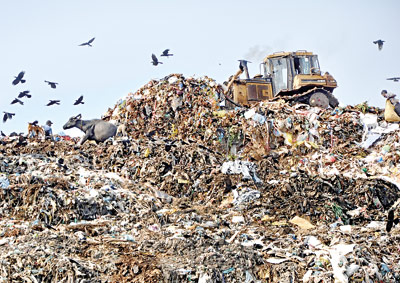News
Blueprint for meeting climate change goals
Systemic emissions cuts, investment in renewable energy, improved public transport, recycling and an increase in forest cover lead Sri Lanka’s plans to battle climate change.

About 6500-7000 metric tons of waste a year is generated in Sri Lanka and 60 per cent of total waste is biodegradable. Pic by Indika Handuwala
Less than a month after pledges made at the Paris Climate Change summit, Sri Lanka’s plans on its contribution to improve the environment were spelled out this week by environmentalists and conservationists.
“We have undertaken on the challenging task of moving away from fossil fuel-based energy towards renewable energy,” the Director of the Climate Change Division at the Mahaweli Development and Environment Ministry, Dr. Sunimal Jayatunga said.
The government will cut down greenhouse gas emissions through switching to alternative fuels, measures to encourage industrial energy efficiency and tax structures to promote sustainable technologies.
“We intend to reduce greenhouse gas emissions by businesses unconditionally by 7 per cent (energy sector four per cent, 3 per cent from other sectors) and conditionally 23 per cent (energy sector 16 per cent and 7 per cent from other sectors) by 2020,” Dr. Jayatunga said.
“The transport sector accounts for 49 per cent of total of greenhouse gases. Our target is to establish energy efficient and environmentally sustainable transport systems by 2020 with 25-40 per cent of public transport green-fuelled,” he added.
The government also aims to introduce an electric railway system, lift the efficiency and quality of public transport and shift passengers from private to public transport.
There are sweeping plans to deal with waste. About 6500-7000 metric tonnes of waste a year is generated in Sri Lanka and 60 per cent of total waste is biodegradable.
At present, only 39 per cent is collected and the government wants to increase this amount to 50-65 per cent by 2030 in order to increase the recycling process , Dr. Jayatunga said.

